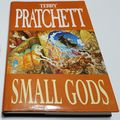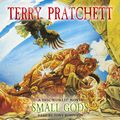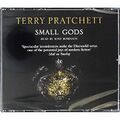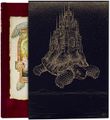Book:Small Gods
| Small Gods | |
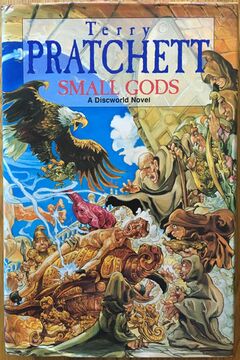 | |
| Co-author(s) | |
| Illustrator(s) | |
| Publisher | Victor Gollancz |
| Publication date | May 1992 |
| ISBN | 0575052228 |
| Pages | 288 |
| RRP | |
| Main characters | Brutha, Om, Vorbis |
| Series | Discworld Series |
| Annotations | View |
| Notes | |
| All data relates to the first UK edition. | |
Blurb
Brutha is the Chosen One.
His god has spoken to him, admittedly while currently in the shape of a tortoise.
Brutha is a simple lad. He can't read. He can't write. He's pretty good at growing melons. And his wants are few.
He wants to overthrow a huge and corrupt church.
He wants to prevent a horrible holy war.
He wants to stop the persecution of a philosopher who has dared to suggest that, contrary to the Church's dogma, the Discworld really does go through space on the back of an enormous turtle (*).
He wants peace and justice and brotherly love. He wants the Inquisition to stop torturing him now, please.
But most of all, what he really wants, more than anything else, is for his god to Choose Someone Else ...
(* which is true, but when has that ever mattered?)
Plot
The story is set in the land of Omnia, an oppressive theocracy that is controlled by a Church that worships the Great God Om and frequently wages war on non-believers. It is about time for Om to manifest in the world and send his eighth prophet. Om has ignored his believers for ages and is surprised to find himself stripped of his divine powers and only able to manifest himself as a tortoise. On the Disc, the power of a God is determined by how many people believe in them.
In Kom, the capital of Omnia, Om meets Brutha, a simple-minded boy with a remarkable memory. He struggles to convince Brutha that he is the God the boy worships. Vorbis, the head of the Quisition, asks Brutha to come with him on a diplomatic mission to Ephebe. While they are there, Brutha starts to take an interest in philosphy. Om meets the philosopher Didactylos and discovers that Brutha is the only remaining Omnian who actually believes in him; the others now only believe in the rules and rituals of the Church.
Brutha's memory helps him to provide information to the Omnians on how to access the Tyrant's palace via the Labyrinth that guards it. He also reads and memorises many scrolls in the library, in order to preserve the Ephebians' knowledge as Omnian soldiers burn the building down. Brutha, Om and a severely injured Vorbis flee the struggle by boat and end up lost in the desert. On their way home, they discover ruined temples that are haunted by Small Gods - ghosts of powerless gods who no-one believes in. Om begins to care about his believers for the first time.
Vorbis regains his strength as they approach Kom. He abducts Brutha and tries to finish Om off without success. He arranges for himself to be ordained the eighth prophet and for Brutha to be publically burned to death by being strapped to a heated bronze statue of a tortoise. Om intervenes; an eagle flies him over to the scene and drops him on Vorbis' head, killing the priest. The crowd witness the miracle and their faith in Om is restored, allowing him to become powerful again.
Meanwhile, Ephebe has formed an alliance with several nations to invade Omnia and a battle breaks out on the coast by Kom. Brutha attempts to make peace, but the invading armies are too distrustful of the Omnians. Om plans to use his physical powers against them, but Brutha argues that he should not interfere with the actions of humans. Om is frustrated but ultimately agrees; instead he travels to the top of Cori Celesti where he sees the other gods gambling on the fates of their believers to gain or lose them. Shocked by the callousness with which they treat their believers, Om loses his temper, even hitting some of the other gods. The soldiers hear a threatening sign from the heavens and stop fighting.
Brutha becomes the Eighth Prophet. He ends the Quisition and reforms the Church, turning the oppressive and dogmatic institution into a fairer-minded theology. For the next century, Omnia is able to enjoy great peace, freedom and prosperity. In the epilogue, Brutha dies on the 100th anniversary of Om's return to power. It is then revealed that the events were orchestrated by Lu-Tze, one of the History Monks, who decided that he would rather have a century of peace than the anticipated century of war.
Cover
The cover illustration was drawn by Josh Kirby. It is dominated by two figures: Brutha, who is chained to an altar in the form of a giant turtle and Vorbis with an eagle-like appearance interrogating him. Above both figures a large flying eagle holds a terrified turtle in its claws.
About the book
When reading the Discworld books starting from the first The Colour of Magic to the newest one notices a gradual change in the style of writing. Not only does the text become more picturesque and atmospheric, but the story itself becomes more elaborate. Whereas in The Colour of Magic the story seems to be a mere carrier for a multitude of jokes and anecdotes, newer books have less comedy, but make a good read, because of the intriguing story. Small Gods is the first book in the Discworld series with a noticeably changed style.
Whereas previous books were driven by satire of the fantasy genre and popular culture, Small Gods touches on deeper themes. The main themes of the book are theism, atheism, morality and ethics. There is a clear contrast between Brutha's earnest faith and compassion, compared to the organized religion of a church which at best is stagnant and corrupt, and at worst is oppressive and extremist. The storyline then reveals that Brutha is the only person who is really believing in Om himself, whereas everyone else is just believing in rules and rituals. It also shows that a bad religion or church can still have good followers.
One of the more important messages of the book is: do good things, simply because they are good and not just because a god demands it. This might not sound too funny, but the messages are hidden in a rather humorous story (this is still a Terry Pratchett book) about Brutha, a novice priest of the church of Om.
Small Gods introduces Lu-Tze the history-monk. The book is also the origin of the phrase "The turtle moves" or De Chelonian Mobile.
Characters
Main Characters
Minor Characters
- Lu-Tze
- Brother Nhumrod
- Bishop Drunah
- General Iam Fri'it, his aspirations to assassinate Vorbis are cut short (as, indeed, is he)
- Sergeant Simony
- Death
- P'tang P'tang, a god
- Didactylos, a philosopher
- Urn, a philosopher, Didactylos' nephew
- "St" Sevrian Thaddeus Ungulant, a philosopher, friend to small gods
- Tyrant of Ephebe
Cameos/Mentioned
- Members of the Omnian Church (current and former, including excommunicated members)
- The SeptArchs, prophets who wrote the 7 books of Omniaism
- Brother Murduck, beaten nearly to death (and flogged the rest of the way), ostensibly by Ephebians, but actually by the Omnian Church itself
- Brother Sasho, tortured for information
- Brother Whelk, teaches Comparative Religion (an interesting topic in monotheistic Omnia?)
- Bishop Kreeblephor, who converted a demon by reason alone in the Year of the Lenient Vegetable
- Brother Preptil, master of music
- Bishop Treem, archivist
- False Prophet Zeb
- False Prophet Zog
- Members of the Divine Legion, the military arm of the Church
- Sergeant Aktar
- Sergeant Fergmen
- Private Dervi Ichlos, killed by Simony
- Members of the Quisition
- Inquisitor First Class Ishmale Quoom, retired
- Deacon Cusp
- Coplei, a bosun on the holy ship Fin of God
- Cut-Me-Own-Hand-Off Dhblah
- Gods and goddesses
- The Sea Queen
- Tuvelpit, God of Wine, aka Smimto
- Offler
- Astoria, Goddess of Love
- Petulia, Goddess of Negotiable Affection
- God of Lettuce (mentioned)
- Blind Io
- Cubal, the Fire God
- Flatulus, Wind God
- Fedecks, Messenger of the Gods, whose name parodies Fedex
- Patina, Goddess of Wisdom
- Foorgol, Avalanche God, whose name is "log roof" backward
- Angus, a small god
- Goddess of Plenty, minor goddess elbowed by Om
- Solar God (Tsortean God of the Sun)
- Philosophers
- Legibus, philosopher, parodies Archimedes
- Aristocrates, philosopher, secretary to the Tyrant, parodies Aristotle
- Xeno, parodies Zeno
- Ibid, philosopher, whose name parodies the expression ibid
- Gordo of Tsort, who wrote about sand
- Irexes, who also wrote about sand
- the Librarian
- General Argavisti, of Ephebe
- Imperiator Borvorius, of Tsort
- Admiral Rham-ap-Efan, of Djelibeybi
- Fasta Benj, fisherman from an unnamed small nation
- Pacha Moj, another person from the same unnamed small nation
- 59th Abbot, who mis-used his ability to see into the future
- 493rd Abbot
- Hodgsonites, Melchiorites, and Ashelians, peoples who were subjugated by the Divine Legion
- Koomi of Smale, who wrote Ego-Video Liber Deorum (Gods: A Spotter's Guide), angering the Omnian Church
- Ur-Gilash, god defeated by Om (and perhaps encountered by Om in the desert, though this isn't made clear), and whose capital city was Gilash
- Customers of Didactylos and Nephew:
- Sister Sestina of Quirm, who walked across coals for a goddess who was really only interested in hairstyles
- Brother Zephilite of Klatch, who did charity work in the name of F'rum, an fairly stupid invisible god
Locations
- Ramtop Mountains
- Omnia, the rimward fringe of Klatch on the Circle Sea
- Kom, capital of Omnia
- Gate of Horns
- Citadel of the Omnian Church
- Place of Lamentation
- Port of Il-Drim
- Ephebe
- Library of Ephebe, 2nd largest library on the Disc
- The Circle Sea
- Pseudopolis (mentioned)
- Djel (mentioned)
- Tsort (mentioned)
- Brown Islands (mentioned)
- Djelibeybi (mentioned)
- Ankh-Morpork (mentioned)
- Erebos, an island that Ossory sailed to on a millstone
- Rim Ocean (mentioned)
- Countries conquered by Omnia
- Unseen University (mentioned)
- Library (mentioned)
- Lost Reading Room (mentioned)
- Library (mentioned)
- Lost City of Ee (mentioned)
- Sto Plains (mentioned)
- Dunmanifestin
- Cori Celesti (mentioned)
- Skant, the Cenobiarch goes off to hermitage here when Vorbis (briefly) becomes the 8th prophet
Miscellaneous
- Year of the Notional Serpent in the Century of the Fruitbat, time frame for this book
- Year of the Astounded Beetle, Brutha was 2 years old then (almost 3) when he saw derechmi, an Ephebian coin
- The Omnian Quisition, parodying Roundworld's Inquisition
- Omnian Hymns
- The Septateuch, holy book of Omnia
- Klatchian Delight, parodies Turkish Delight
- Pointless Albatross
- Scalbie
- Books written by philosophers (they seem to prefer short titles)
- Didactylos' Meditations
- Xeno's Reflections
- Aristocrates' Platitudes
- Ibid's Discourses and Civics
- Legibus's Geometries
- Hierarch's Theologies
- Orinjcrates' (whose name is a pun on "orange creates") On the Nature of Plants
- Philo's Bestiary
- Abraxas's On Religion
- Grido's Mechanics
- Gnomon's Ectopia (a gnomon is the triangular part of a sundial, while ectopia is the displacement of a bodily organ; the pun here, however, may be on Sir Thomas More's Utopia
- Dykeri's Principles of Navigation
- L-space
- Ambiguous Puzuma
- Aurora Corealis, the hublights, parodying the Roundworld Northern Lights, whose proper scientific name is Aurora Borealis
- Most Holy St Bobby, Ossory's ass
Adaptations
Radio
A radio adaptation was broadcast by BBC Radio 4 in 2006.
Cast:
- Patrick Barlow: Om
- Carl Prekopp: Brutha
- Alex Jennings: Vorbis
- Geoffrey Beevers: Nhumrod, St. Ungulant
- Gerard McDermott: Didactylos, Cut-Me-Own-Hand-Off Dhblah
- John Cummins: Urn
- Nick Sayce: Sergeant Simony
- Anton Lesser: Narrator
- Michael Kilgarriff: Death
Graphic Novel
Adapted into a comic book Small Gods A Discworld Graphic Novel in 2016, illustrated by Ray Friesen.
Notes
- This book is not a part of a series, although some place it in a "Gods" series together with Pyramids and Hogfather. It was placed together with these two novels in the collection The Gods Trilogy.
- Originally published in Great Britain by Victor Gollanz Ltd.
Copyright (c) 1992 by Terry and Lyn Pratchett.
Gallery
-
Corgi Paperback
-
'Letterbox' Hardback
-
Cover by Michael Sabanosh
-
Cover by Michael Sabanosh (paperback)
-
Paperback 2004
-
Audio Cassette
-
Audio CD
-
Audio CD (Black cover)
-
US Cover
-
Paperback 2012
-
Unseen Library Edition
-
Discworld Collector’s Library Edition
-
Folio Society Illustrated Edition
-
Paperback 2022
External Links
Small Gods Annotations - The Annotated Pratchett File
| Previous book |
Discworld Series | Next book |
|---|

